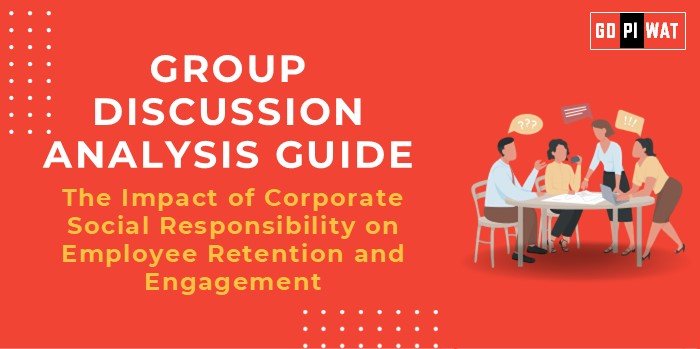📋 Group Discussion (GD) Analysis Guide: The Impact of Corporate Social Responsibility on Employee Retention and Engagement
🌐 Introduction to Corporate Social Responsibility (CSR) and Its Impact
Opening Context: In a rapidly evolving corporate landscape, companies are increasingly recognizing Corporate Social Responsibility (CSR) as a strategic tool for sustainability, branding, and internal cultural growth. A significant outcome of effective CSR initiatives lies in improving employee engagement and retention.
Topic Background: CSR refers to the efforts businesses make to positively impact society while maintaining profitability. Beyond external benefits, CSR has emerged as a powerful force for fostering employee satisfaction, loyalty, and organizational commitment. In competitive sectors, the alignment of CSR goals with employee values has been proven to reduce attrition and enhance engagement levels.
📊 Quick Facts and Key Statistics
🏢 Retention Rates: Companies with strong CSR initiatives experience 50% lower turnover (Cone Communications Report, 2023).
😊 Engagement Impact: Employees engaged in CSR activities report 20% higher job satisfaction (Harvard Business Review).
🏆 Brand Perception: 75% of employees believe their company’s CSR commitment enhances corporate reputation.
📈 Productivity Boost: CSR-focused organizations report a 13% increase in productivity due to higher morale (Deloitte Insights, 2023).
🤝 Stakeholders and Their Roles
- 🏢 Corporates: Designing and implementing meaningful CSR initiatives aligned with employee and organizational goals.
- 👩💻 Employees: Actively participating in CSR programs, leading to improved morale and purpose-driven work culture.
- 🛠️ HR Departments: Facilitating CSR-driven policies and creating employee-centric engagement opportunities.
- 🌱 Communities: Benefiting from CSR initiatives, creating a reciprocal sense of purpose for employees.
- 📜 Governments and NGOs: Collaborating with businesses to ensure CSR programs deliver tangible societal impact.
🏆 Achievements and Challenges
✨ Achievements:
- ✔️ Improved Employee Retention: Companies like Salesforce and Microsoft report increased retention rates due to strong CSR commitments.
- 🤝 Enhanced Engagement: CSR participation fosters personal growth, purpose, and team-building opportunities.
- 🌟 Positive Organizational Culture: CSR integrates ethics and purpose into work culture, boosting employee trust and alignment.
- 🏅 Employer Branding: CSR programs improve employer reputation, attracting top talent.
⚠️ Challenges:
- 💰 Resource Constraints: Smaller businesses may struggle to fund CSR initiatives sustainably.
- ⚡ Lack of Genuine Engagement: Superficial CSR programs (greenwashing) can lead to employee skepticism.
- ❌ Alignment Issues: Employees disengage when CSR goals do not align with their personal values.
🌎 Global Comparisons:
- 🇺🇸 Patagonia (USA): Strong CSR focus on environmental conservation has resulted in one of the industry’s highest retention rates.
- 🇪🇺 Unilever (Europe): Employees participating in sustainability programs show 38% higher engagement levels.
📚 Case Study:
- 🏷️ Infosys’ CSR Impact: Infosys’ “Infosys Foundation” initiatives on education and rural development have significantly contributed to employee pride, with surveys reporting 90% internal engagement in CSR programs.
🗣️ Structured Arguments for Discussion
Supporting Stance: “CSR programs significantly improve employee engagement and retention by fostering a sense of purpose and responsibility, reducing turnover.”
Opposing Stance: “CSR initiatives may only offer surface-level benefits; without authentic commitment, employee skepticism can lead to disillusionment.”
Balanced Perspective: “While CSR enhances employee engagement and retention, its success depends on authenticity, resource allocation, and alignment with employee values.”
💡 Effective Discussion Approaches
- 📜 Opening Approaches:
- Statistical-Driven: “With companies reporting a 50% drop in turnover due to CSR initiatives, it is evident that CSR significantly impacts retention and engagement.”
- Case Study Introduction: “Patagonia’s CSR-led strategy demonstrates how employee purpose can directly result in higher engagement and loyalty.”
- Ethical Perspective: “CSR goes beyond profits; it addresses employee values, creating a purpose-driven workforce.”
- 🛠️ Counter-Argument Handling:
- Example: “While CSR can sometimes be seen as a marketing gimmick, companies like Salesforce demonstrate that genuine CSR builds long-term loyalty.”
📈 Strategic Analysis of Strengths and Weaknesses
- 🏅 Strengths: Builds a purpose-driven workforce, enhances company reputation, and boosts employee trust.
- ⚠️ Weaknesses: Requires substantial investment, risks greenwashing and skepticism.
- 💡 Opportunities: Align CSR with ESG goals, develop personalized CSR opportunities for employees.
- ⚡ Threats: Misalignment of values and superficial CSR damaging organizational trust.
🎓 Connecting with B-School Applications
- 📚 Real-World Applications: Operations in CSR-driven supply chain sustainability, and HR projects on engagement strategies.
- 💬 Sample Interview Questions:
- “How can CSR initiatives drive employee loyalty in competitive industries?”
- “What steps can businesses take to align CSR goals with employee values?”
- 🔑 Insights for B-School Students: CSR is a critical factor for modern organizational success and employee satisfaction. Business students must explore strategies to balance profitability with CSR.


